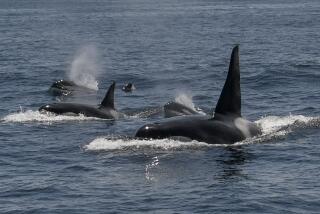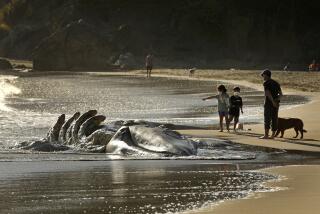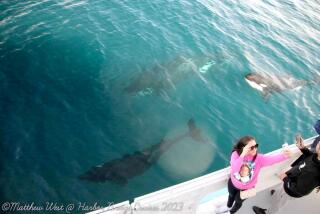Editorial: SeaWorld’s ban on orca shows should be just the start of changes
Times have changed for SeaWorld. If that wasn’t obvious before, it became absolutely clear Monday when officials at the company announced that their controversial orca shows would be phased out at the San Diego park — implicitly acknowledging that the shows are a relic of outdated attitudes toward marine mammals.
If SeaWorld is going to continue to house killer whales for a while — a reasonable conclusion because its existing whales would have little chance of surviving in the wild — it makes sense to create a more natural setting for them, as the company plans to do, and make the exhibit more like an educational aquarium than a marine circus.
SeaWorld would be better off ending its breeding program...and reserving its tanks for injured animals that cannot survive in the wild.
But that should be just the start. The company’s welcome announcement leaves many important issues unaddressed. Will SeaWorld continue to breed its killer whales, counting on them to bring in attendance in their new, more natural setting? That would be an improvement over shows that call on the animals to engage in human-designed tricks in sterile-looking tanks rather than leaving them to their natural behaviors. But a life in small quarters is not appropriate for whales that travel such long distances in the wild. And a continued breeding program would ensure that the captivity doesn’t end.
SeaWorld would be better off ending its breeding program, allowing its orca population to die out naturally — which would still give it decades of exhibition — and reserving its tanks for injured animals that cannot survive in the wild.
If SeaWorld doesn’t do that on its own, it might be forced to do so over time. On Friday, Rep. Adam Schiff (D-Burbank) announced plans to introduce legislation to ban the capture of wild orcas (something SeaWorld hasn’t done in decades) and captive breeding. The bill’s chances of passage are slim, but the issue isn’t going away. State legislation that would have banned San Diego SeaWorld from captive breeding was held over to next year; if it comes back, it would have a better chance.
Such legislative efforts are reflections of a larger obstacle confronting SeaWorld. The documentary “Blackfish,” dismissed as inaccurate by the company, has nonetheless strengthened a growing public sense that keeping orcas in captivity is wrong. Attendance at the marine park has been down, and it’s unclear whether paying customers will buy the idea that a killer whale in a nicer-looking tank is contented, any more than they bought Sea World’s assertion that the performing orcas were willing and happy collaborators in their training and shows for big — though shrinking — crowds.
Follow the Opinion section on Twitter @latimesopinion and Facebook
More to Read
A cure for the common opinion
Get thought-provoking perspectives with our weekly newsletter.
You may occasionally receive promotional content from the Los Angeles Times.






